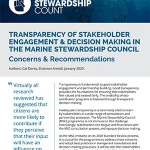We are rating MSC against our best practice recommendations that draw from the leading literature on consultation as well as our members’ many years of experience engaging with the MSC programme. These best practices aim to ensure that stakeholders understand who is invited to engage and why, how best to engage, how input is used, and how and why decisions are made at each step of the way.
April 2023
This rating covers the entire review process, taking into account our 3 previous rounds of scorecards, and including the 2022 public consultation phase of the FSR. The multi-year review included several meetings with stakeholders, workshops, webinars and surveys. The most recent phase of the FSR in 2022 included a 60-day public consultation survey on the draft Fisheries Standard content, and several webinars intended to introduce the Standard.
- Throughout this review, the Stakeholder engagement process saw significant improvements when compared to the previous FSR. There were several entry points by which to engage including workshops, webinars, surveys, written submissions and meetings with MSC staff, most of which were open to all stakeholders. Throughout the process, the MSC provided the information necessary to engage in an informed way and provided some progress updates throughout. Risk assessments and summary reports were provided to all stakeholders to inform their feedback, a notable improvement in access to information.
Despite these improvements we have identified several areas for further improvement:- The stakeholder selection process has been unclear with little rationale provided for invite-only workshops and meetings.
- It was unclear how the information collected from stakeholders would be used to inform the decision making process.
- While some of the proposed changes made following the final opportunity for consultation were posted on the website, the information available on the MSC website was not easily accessible and in some cases did not provide sufficient detail to determine how this would affect the Standard in practice.
- There were several delays, little notice for key pieces of consultation, and consultation periods were insufficient in many cases.
- A notable shortcoming of the process came at the final stage of stakeholder consultation in 2022 when the draft Standard was released and a short, limited survey was the only and final means of providing feedback. It is unclear why no further consultation was held given the large number of changes made after the proposed draft was released. Further, numerous stakeholders voiced concerns with the limited length of the final consultation, being 60 days, and requested an extended consultation period; this was not granted.
When the MSC announced that the board had approved the contents of the Standard as proposed, we were hopeful that many of the improvements, as highlighted in our May 2022 letter, would make it into the final Standard. Unfortunately, many changes were made after the final consultation survey, using only feedback from the board, Stakeholder Advisory Council and Technical Advisory Board. The reversal of the scope change on marine mammals, revising the ETP species decision tree and changes to the Evidence Requirements Framework (ERF) were all key changes made between the final consultation survey and releasing the final Standard, without explanation or consultation with stakeholders.
As highly engaged stakeholders, it was disappointing to have seen so much improvement in the process and effort from the MSC, only to have the opaque decision making process thwart several key improvements at the final stage and with little rationale.
